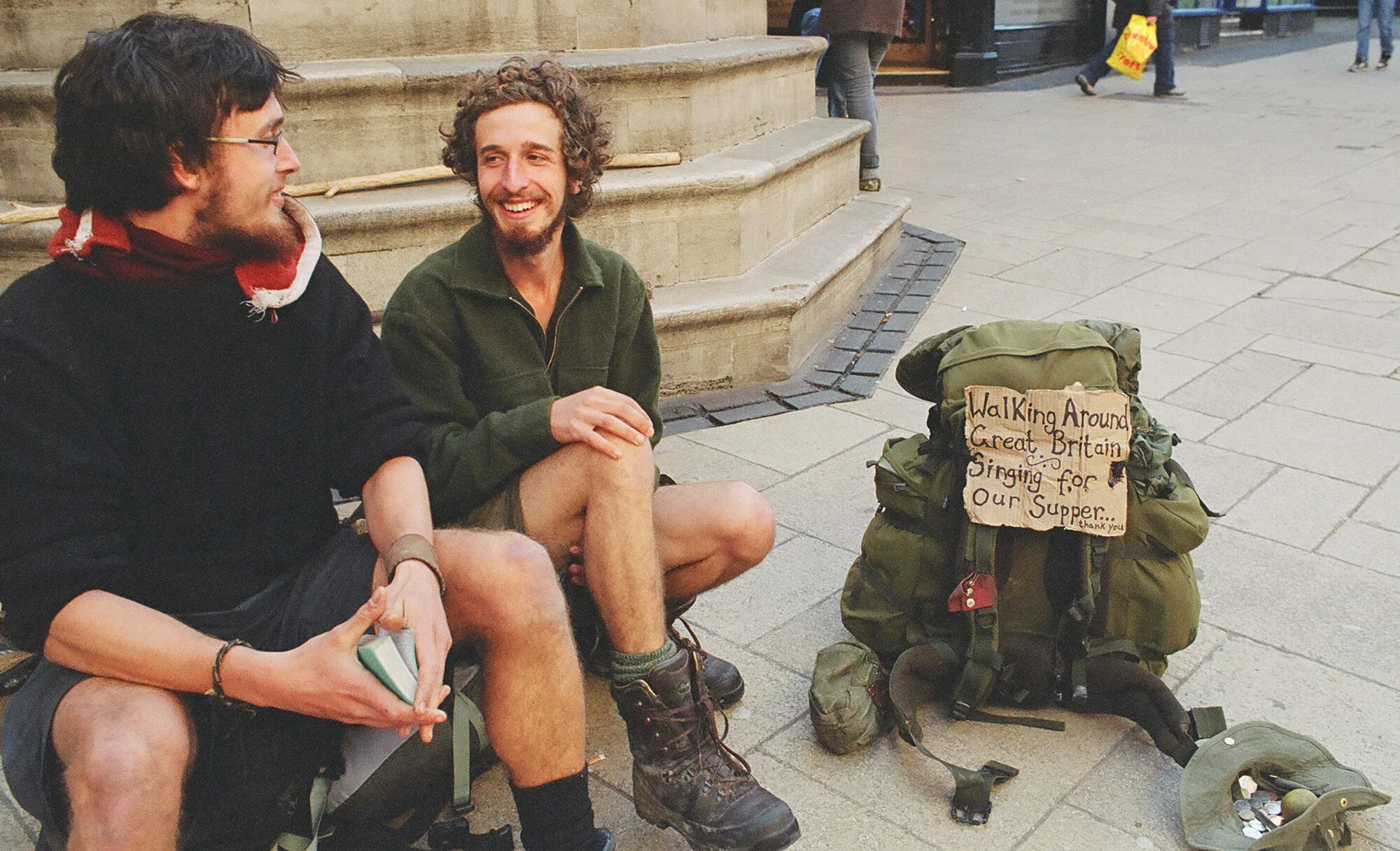
To be a Wandering Minstrel
Buying from the pictured links helps sustain my website without costing you anything extra. Thank you!
Wandering Minstrelsy is a functional way to power your Wayfaring journey.
Tale and Journey, Song and Land, Happily each goes hand in hand…
If you want to take the footpath on a long journey somewhere, but you haven’t got the money to pay your way, do not despair. You can become a Wandering Minstrel, and sustain your journey by providing music as you walk.
Voice or Instrument?
The first decision is Voice vs Instrument. I recommend voice, as it weighs and costs nothing. However, if you are an instrumentalist, this will obviously seem the natural choice for you. Decide whether you can handle carrying the weight of your chosen instrument? Sometimes it’s possible to acquire a miniaturised version of a full size instrument - a ukulele instead of a guitar - a tin whistle instead of an oboe - a mandolin instead of a banjo.
Furthermore, if you do decide to use an instrument, you need to work out how to safely transport it. Instruments don’t like getting bashed or wet, and stringed instruments are sensitive to damp. But you’ll probably have to strap your instrument to the outside of your backpack, where it is vulnerable to all such conditions.
One option for a lightweight custom case is to acquire blocks of styrofoam, and glue them together to the required size, before carving out a precise outline of your instrument, and sandwiching two sides together, held together with straps. A spoon-knife is a useful tool for this.
Styrofoam Bricks - 10 piece - £15.50
Around this impact proof foam casing, you’ll need to use a dry sack. And within the case, you’ll probably want to carry some silica gel packages to keep the damp at bay.
You may wish to take an instrument Wayfaring simply to learn how to use it, even if it is not your primary music-making tool. But I would still recommend the oldest and simplest instrument of all - the voice - if you want to be a Wandering Minstrel.
Electric amplification is not something you should think about. Go natural. Learn to sing more loudly, and choose spots which offer better natural amplification. I have only once used microphones while Wayfaring as a Wandering Minstrel, and it went horribly wrong. The tradition of being a Wandering Minstrel, as an ancient art of public music, is not well supported by modern devices. Remaining true to the oldest form of the tradition is best, in my opinion. Not least because a PA has to be carried and charged. Avoid such kerfuffle.
What to sing?
The most obvious songs to sing are those you know and love. But be warned - most modern music is copyright, so performance technically requires licensing and registration with PRS, who will want to get paid.
If you want to bypass this potential hassle, and sing songs that fit more deeply within the land and national consciousness, I recommend traditional songs. They are the fruit of this land, and resonate on levels that modern music cannot reach. If we count the outnumbering dead, these are the true ‘pop’ songs of our land.
I have listed a few of my favourites here.
Try to collect trad songs that cover all bases - sailing songs, war songs, drinking songs, love songs, departing songs, rebel songs. This way, you will always have the right song for a setting.
My best busking work has been as a pair, singing traditional songs in harmony. This really works, and you can play around the main melody and create all sorts of new alignments of mood and meaning just by having a harmonic interplay. Plus, it is much easier to perform as two, you are less naked than a single solo voice. But getting over this is very fearlessness-enhancing.
Occasionally, me and a fellow singer both found our hearing went funny mid-busk, leaving us only able to hear ourselves from a listening point that seemed a few feet in front of us. I’m not sure what causes this, but we call it ‘angelic ear’. Don’t worry if it happens to you, just keep singing…
When you busk as a pair, be sure not to face in opposite directions, as your voices need to merge to create a tonal harmony. Imagine lines from your voice, and always try to make sure they overlap, by facing slightly toward each other. This will make your two voices sound like a choir of many.
It is always best to learn the songs by heart, but possible also to have your lyric prompt book to assist.
Where to sing?
If you are singing for pleasure or practice, you can sing everywhere. Trees, animals, hilltops, caves - wherever you are is an appropriate spot for a song. Particularly good are enclosed spaces - churches, chapels, hollow trees, caves. But really, anywhere you find yourself in the landscape, try a quick song to see how the space answers back - like a cultural sonar. The birds and insects are always listening.
Churches are typically the most wonderful places to sing, as they are built for the amplification of human voice. And each has a slightly different flavour of sound. But try to learn church-appropriate songs. A lusty number about the plough-boy and the nutting maid is probably ill-fitting for the still waters of an ancient church.
If you are singing to raise funds to support your Wayfaring journey - busking - you need people to sing for. Actually, this is not always true. I have busked empty village centres, not seeing a soul for 30 minutes, and only when I put away my sign to go did people open their doors and bring out food and coin. You never know who is listening.
But to raise significant funds, you should sing where there are a reasonable number of people. This means high streets, town and village centres, markets etc.
Be warned about excessive busyness - too much noise and intensity is hard to be heard over. Roads are your greatest enemy as a singer. It is better to choose a quieter and more relaxing space where you can enjoy the sound of your songs, than a place where you struggle and feel bad. You will never sing over the noise of a car.
Make sure you are not impeding foot traffic, including wheelchairs and baby buggies, and that there is plenty of space to step around you. This is even more pronounced with social distancing. If the police think you are in the way, they may ask you to move on. Doorways of closed shops are a good option, but they narrow your bandwidth. Ideally, you want to be heard right down the street, so people have time to reach the decision to fling you their change.
Also, consider the appearance of where you are singing. Is it beautiful? Is there carved stonework? Do you look like part of the living cultural heritage of the town? This helps raise the pounds.
How to Busk
The mechanics of busking are pretty simple. You need a hat (or bowl/box) to collect your coins. You may want to seed-fund this with a small handful of silver. People are often reticent about going first at anything.
Also recommended is a simple sign. People are good at ignoring sound, but the written word piques even the most steely monkey’s curiosity. I recommend ‘Singing for my supper’, and ‘Walking to…’. This shows that you are a Wayfarer, encouraging people to support your journey with this one-off opportunity, and that doing so will not encourage you to linger semi-permanently.
Some places have busking licenses, but I have never worried about this too much. As long as you are not amplified, and are moving on the next day, it seems redundant faff to apply for a license in every separate town.
If you have recordings for sale, you may wish to advertise this with cards, or on another sign, so people who step up can later go and download your music and drop some digital funds.
When someone drops you money, whether a child or OAP, be sure to acknowledge this gift with eye-contact and a smile. Perhaps a funny little bow? I like to slip out a mid-line thank-you.
If someone steps forward to talk to you, always finish the verse before engaging - even if it is a police officer. Traditional songs deserve respect, and you should never cut one off mid-flow.
If you have a limited repertoire, take a break before looping. Stationary listeners - people in offices or behind doors - will not want to hear the same songs 5 times in a short period. Learn more songs, and move location after looping twice.
If your busk is very successful, and notes fill your hat, don’t be ashamed to remove some mid-busk. This helps keep the sympathy pound flowing.
After you have busked, go to a cafe or shop who get through a lot of change, and ask permission to change your money to notes. You won’t want to carry it in heavy coins. Don’t count the money in the street, it looks wrong. And buy something afterward.
Consider passing on some of your busking money if you see people less fortunate than yourself.
Don’t spend all your busking money at once. Busking opportunities might dry up later down the path. That being said, if you are down to your low ebb of funds, don’t be afraid to spend it all, to pave the way for dramatic rescue. The piper always gets paid.
Sing well, and walk well!






